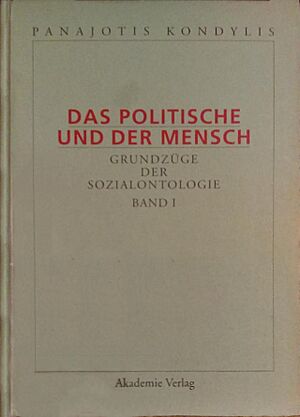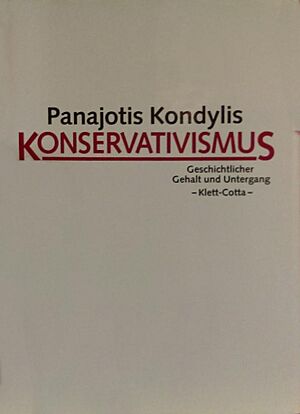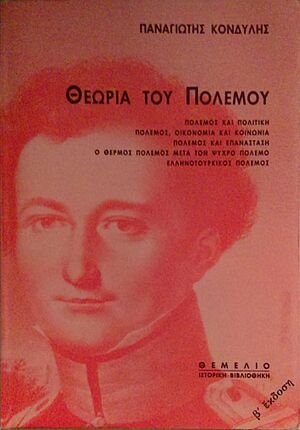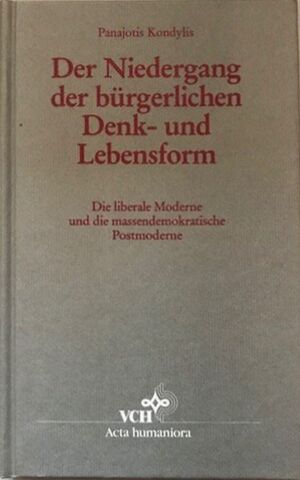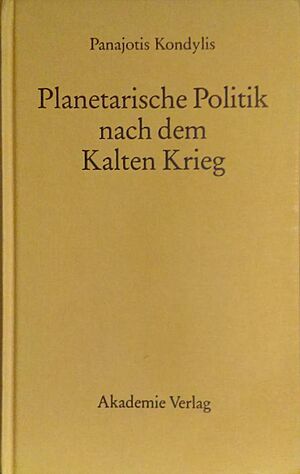Panagiotis Kondylis facts for kids
Quick facts for kids
Panagiotis Kondylis
|
|
|---|---|

Panagiotis Kondylis's only published picture
|
|
| Born | 17 August 1943 Drouva near Olympia, Elis, Greece
|
| Died | 11 July 1998 (aged 54) Athens, Greece
|
| Alma mater | University of Athens Goethe University Frankfurt University of Heidelberg |
| Era | 20th-century philosophy |
| Region | Western philosophy |
| School | Continental philosophy Western Marxism Conservatism |
|
Main interests
|
Social philosophy, political philosophy, philosophy of culture |
|
Influences
|
|
Panagiotis Kondylis (Greek: Παναγιώτης Κονδύλης; German: Panajotis Kondylis; 17 August 1943 – 11 July 1998) was a Greek thinker, historian, and translator. He mainly wrote in German and translated most of his own work into Greek. He is seen as following in the footsteps of great thinkers like Thucydides, Niccolò Machiavelli, and Max Weber.
Kondylis studied many old texts in six different languages: Greek, Latin, German, French, Italian, and English. He didn't like fancy words or ideas that he thought were just popular trends. He believed in understanding things directly from their original sources.
Contents
Life Story
Panagiotis Kondylis was born in 1943 in a small village called Drouva, near Olympia, in Greece. When he was six, he moved with his father, who was a military officer, to Kifisia, a town near Athens. There, he went to school.
He studied classical languages and philosophy at the University of Athens. During this time, he became interested in Marxism, a way of thinking about society and economics. He also studied philosophy, history, and political science at universities in Frankfurt and Heidelberg, Germany.
At Heidelberg, he earned his PhD (a high-level university degree) by writing a 700-page study. This study was about the early ideas of famous German philosophers like Hegel. His work was seen as new and exciting at the time.

Kondylis received important awards, like the Goethe Medal in 1991 and the Humboldt Prize in 1994/95. Even with these honors, he chose to be an independent scholar, meaning he didn't work for a university. He tried once to get a job at the University of Athens, but it didn't work out. After that, he never wanted an academic job, saying that "academic philosophy is dead."
He passed away in Athens in 1998. His large library of about 5,000 books was given to the Aristotle University of Thessaloniki by his sister. Today, there's a special "Kondylis" section in their library. Conferences have been held in Germany and Greece to honor his memory.
His Work and Ideas
Most of Kondylis's books were written in German, and he translated many of them into Greek himself. He was interested in many different subjects, including:
- The Enlightenment, a period of new ideas in Europe.
- The philosophy of war, especially the ideas of Clausewitz.
- The works of Hegel and Marx.
- Western culture and its changes.
- Conservatism, a political and social philosophy.
- Post-Modernity, a recent period in history and culture.
- International affairs.
He also translated classic books by authors like Xenophon, Machiavelli, and Marx into modern Greek. He helped publish many important books in Greek, making famous thinkers like Hobbes and Foucault available to Greek readers.
Kondylis's most famous books are Die Aufklärung (The Enlightenment) and Macht und Entscheidung (Power and Decision).
Main Ideas
Kondylis aimed to be "scientific" in his writing. This meant he wanted to describe and explain things as they are (facts), rather than saying how they should be (values).
A key idea in all his writings is that human behavior and ideas are shaped by "power" and "decision." He believed that people and groups are always trying to preserve themselves and gain power. This often involves seeing others as friends or foes.
As societies become more complex, power isn't just about physical strength. It's also about symbols and values. However, the ability to use physical power is always there. Even scientific knowledge, he argued, can be used in arguments. But true scientific knowledge, by focusing on facts, can help explain the many ways humans exist and think.
The Political and Man
His last big work, Das Politische und der Mensch (The Political and Man), was not finished when he died. In it, he tried to create a scientific theory to describe how societies work. He looked at how people relate to each other, how politics works, and what it means to be human.
Kondylis believed that certain things are always true about humans, like the desire to survive by gaining power and the friend-foe relationship. These ideas show up in different ways throughout history, depending on the time and culture.
The Enlightenment and History of Ideas
In Die Aufklärung (The Enlightenment), Kondylis explored major ideas in European history from the Middle Ages to the 19th century. He showed how thinkers struggled with ideas about what is true and what is right.
He argued that ideas like "self-preservation" and "power" are key to understanding human history. He looked at many famous philosophers, like Machiavelli, Hobbes, and Spinoza, and how their ideas shaped the modern world. His books are like detailed guides that also explain the main reasons behind changes in European thought.
Power and Decision
In Macht und Entscheidung (Power and Decision), Kondylis explained his own view of life and his work. He saw "decision" as how people create their views of the world. These views are always linked to power and often involve seeing others as enemies.
He believed that all human beliefs and ideas are ways to make personal interests seem like objective truths. This comes from a "decision" about what to do, who is a friend, and who is an enemy in the constant struggle for survival. So, our ideas and beliefs are like tools we use in the daily fight for power and to protect ourselves.
Conservatism
Kondylis's book Konservativismus. Geschichtlicher Gehalt und Untergang. (Conservatism. Historical Content and Decline.) offered a new way to understand conservatism. Most people thought conservatism started as a reaction to the French Revolution. But Kondylis argued that it had existed since the Middle Ages.
He showed how conservative ideas changed over time, especially after the French Revolution. He also explained how early anti-capitalist ideas came from conservatives who saw their old way of life being destroyed by new money-based systems and the Industrial Revolution.
Some people, like the American intellectual Paul Gottfried, even called Kondylis "one of the great conservative thinkers of our age."
Theory of War
In Theorie des Krieges (Theory of War), Kondylis disagreed with how some people understood Clausewitz's ideas about war. Clausewitz famously said, "war is a continuation of politics by other means." Some thought this meant he was against war.
But Kondylis argued that Clausewitz saw war as a neutral tool in the endless search for power. War, for Clausewitz, was just one way to achieve political goals in a world that is often unsafe. Kondylis believed Clausewitz's ideas could explain all kinds of warfare, from ancient guerrilla fighting to modern high-tech conflicts.
The Decline of Bourgeois Thought
In Der Niedergang der bürgerlichen Denk- und Lebensformen. (The Decline of Bourgeois Thought- and Life-Forms.), Kondylis described a big change in society that happened around 1900. He said that the old "bourgeois-liberal" way of thinking, which valued hierarchy and humanism, was replaced by a new "mass-democratic" era.
This new era brought huge changes like mass production, mass consumption, and more individual freedom. Kondylis looked at how this shift affected art, literature, music, philosophy, and even everyday life from the late 19th century through the 1960s and 1970s.
Planetary Politics after the Cold War
In Planetarische Politik nach dem kalten Krieg (Planetary Politics after the Cold War), Kondylis discussed global issues after the Cold War. He talked about how terms like "conservative" and "liberal" are often misused. He also explored how "human rights" became a global idea, especially from America.
He saw the end of the Cold War as a major turning point. He believed that the "European Modern Era," which started with big discoveries in the 15th and 16th centuries, was now being taken over by a "Planetary Era." This meant that European history was becoming part of a larger global history, sometimes with unexpected results.
Overall, Kondylis's work aimed to study human affairs in a scientific way, focusing on facts and logic. He tried to connect different subjects like philosophy, history, and politics, believing they were all linked. He saw himself as an "observer of human affairs" or a "historian of ideas," rather than just a "philosopher."
Books and Articles
- Die Entstehung der Dialektik. (The Coming into Being of Dialectics). Stuttgart: Klett-Cotta, 1979.
- Die Aufklärung im Rahmen des neuzeitlichen Rationalismus. (The Enlightenment within the Framework of Modern Rationalism). Stuttgart: Klett-Cotta, 1981.
- Macht und Entscheidung. (Power and Decision – The Formation of World Images and the Question (Problem) of Values). Stuttgart: Klett-Cotta, 1984.
- Konservativismus. (Conservatism. Historical Content and Decline). Stuttgart: Klett-Cotta, 1986.
- Marx und die griechische Antike. (Marx and Ancient Greece). Heidelberg: Manutius-Verlag 1987.
- Theorie des Krieges. (Theory of War). Stuttgart: Klett-Cotta, 1988.
- Die neuzeitliche Metaphysikkritik. (Modern-era Critique of Metaphysics). Stuttgart: Klett-Cotta, 1990.
- Der Niedergang der bürgerlichen Denk- und Lebensformen. (The Decline of Bourgeois Thought- and Life-Forms. The Liberal Modern and the mass-democratic Post-modern). Weinheim: VCH-Verlagsgesellschaft, 1991.
- Planetarische Politik nach dem kalten Krieg. (Planetary Politics after the Cold War). Berlin: Akademie-Verlag 1992.
- Montesquieu und der Geist der Gesetze. (Montesquieu and the Spirit of the Laws). Berlin: Akademie-Verlag 1996.
- Das Politische und der Mensch (The Political and Man). Berlin: Akademie-Verlag 1999. (Published after his death)
- Das Politische im 20. Jahrhundert. (The Political in the 20th century). Heidelberg: Manutius-Verlag 2001. (A collection of articles)
- Machtfragen. (Questions of Power). Darmstadt: WBG 2006. (Includes Power and Decision and other articles)
- Machiavelli. Akademie-Verlag, Berlin 2007.
- Books and articles published only in Greek
- Η Ελλάδα, η Τουρκία και το Ανατολικό Ζήτημα. (Greece, Turkey and the Eastern Question). Athens: Γνώση, 1985.
- Ο Νεοελληνικός Διαφωτισμός. Οι φιλοσοφικές ιδέες. (The modern Greek Enlightenment. The philosophical ideas.). Athens: Θεμέλιο, 1988.
- To Αόρατο Χρονολόγιο της Σκέψης. (The Invisible Chronology of Thought. – three interviews with Panagiotis Kondylis.). Athens: Νεφέλη, 1998.
- Μελαγχολία και Πολεμική. (Melancholy and Polemics. – a series of articles by Kondylis, published after his death.). Athens: Θεμέλιο, 2002.
- English translations
- Some of Kondylis's writings, including Macht und Entscheidung (Power and Decision) and Planetarische Politik nach dem kalten Krieg (Planetary Politics after the Cold War), can be read online for free.
 | William Lucy |
 | Charles Hayes |
 | Cleveland Robinson |


